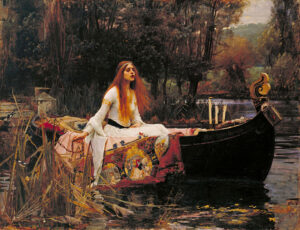There was a certain brother who came to Scete to see Abba Arsenius, entered the church and entreated the clergy to take him to see him. The clergy said to him, “Refresh yourself a little and you will see him.” The brother said to them, “I will eat nothing until I meet and see him.” When the clergy heard this they sent a brother with him to show him Abba Arsenius, because his cell was some distance away. And when they had arrived there, they knocked at the door and went inside. After greeting him and praying, they sat down and held their peace. The brother who was from the church answered and said, “I will leave, pray for me.” But when the other brother saw that he did not speak with the elder, he said to the brother from the church, “I also will go with you,” and they departed together.
Then he entreated him, saying, “Take me also to Abba Moses who was a thief.” When they went to him, the elder received them with joy, and having refreshed them greatly he dismissed them in peace. The brother who had brought the visitor to Abba Moses said to him, “Behold, I brought you to a man from a foreign land and to an Egyptian, which of the two pleases you? And he answered and said to him, “The man who just received me and refreshed me.” When one of the elders heard what had happened, he prayed to God and said, “O Lord, explain this thing to me, for one flees from the world for Your Name’s sake and the other welcomes and kindly receives others for Your Name’s sake.” Behold, suddenly there appeared to him on the river two great boats: Abba Arsenius and the Spirit of God were traveling in silence in the one; and Abba Moses and the angels of God, feeding the monk with honey from the comb, were in the other.
Source: Sayings of the Strong Saint Abba Moses
Okay, this is a little bit of a stretch, but just hang on for a moment. Abba Arsenius prefers to be alone to do his work. His work is important, and it just isn’t in his disposition to greet young novices beginning the monastic craft. Abba Moses, on the other hand, lives to greet others. His purpose is to be a living symbol of the tradition of hospitality in the desert. Of course, when we look at the background of these two desert fathers, this is something like an early contrapasso. Arsenius was part of the socializing of the Roman court, so he seeks complete seclusion in the desert. Moses was a bandit, so he is generous to any guests who come to him.
But, I wonder if it can also be something important here for educators. Arsenius represents the contemplative life. He seeks to learn more about the divine, which should in turn lead to a greater love. In this way, he is like the researcher who values truth and the dignity of the discipline. Moses is always available to the young brothers who are learning the way of the desert. Like a professor who is always gracious during office hours, Moses greets his guests and sets an example. When we look at the saying in this light, what can we take away from it?
Let’s look again at the story. It is presented as a puzzle. We don’t know which form of monasticism is the highest. It echoes Martha and Mary from the Gospels and is echoed by Dante’s re-purposing of Leah and Rachel. The question is what’s higher, contemplation or action? What’s more important, theory or practice? Who should be valued more, the brilliant researcher, or the brilliant educator? We may secretly think researching is greater because the purpose of the institution is to seek truth. Or rather we may think that teaching is greater because that is the purpose of higher education and knowledge is meant to be shared with others.
Then the vision comes in the end, and the answer is: both. Both abbas are on great boats. One is alone with the Spirit, and the other is fed by angels. The young brother may have preferred the one who greeted him with hospitality (thinking with his stomach like Br. Monday) but there’s a greater depth to each.
Considering this, I wonder if we should be more open in higher education to these two roles being exemplified in individual persons. My own preference is to have a balance between research and teaching. I’m lucky in my area that there is less of a divide between the two. My research informs my teaching, and my teaching implements my research. But I wonder if instead of pushing every unique individual into a perfectly balanced role if there can be room for more than that.
There’s room for the Arsenius who tirelessly spends hours in the lab or builds new theories and models. There’s room for the Moses who waits patiently during office hours knowing no one will come till week six. Instead of telling Arsenius that he isn’t a good enough teacher, or Moses that he’s not bringing in enough funding, why can’t we respect the unique value each brings?





2 Responses
[…] 6. What Can the Desert Tell Us about the Researcher/Educator Debate? […]
[…] 14. What Can the Desert Tell Us about the Researcher/Educator Debate? […]